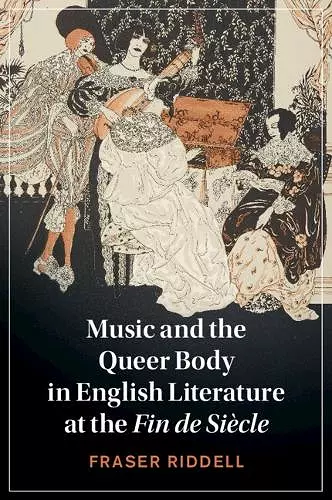Music and the Queer Body in English Literature at the Fin de Siècle
Format:Paperback
Publisher:Cambridge University Press
Published:27th Mar '25
Currently unavailable, and unfortunately no date known when it will be back
This paperback is available in another edition too:
- Hardback£78.00(9781108839204)

The first comprehensive study of music and queer identities in late-nineteenth and early-twentieth century English literature.
Synthesizing music, literature and theory, Fraser Riddell reveals the importance of music in emergent queer identities at the fin de siècle. Illuminating for both students and researchers of the period, his compelling arguments for music's queer agency will fascinate anyone interested in Aestheticism, Decadence and the Bloomsbury Group.Drawing on an ambitious range of interdisciplinary material, including literature, musical treatises and theoretical texts, Music and the Queer Body explores the central place music held for emergent queer identities in the late-nineteenth and early-twentieth centuries. Canonical writers such as Walter Pater, E. M. Forster and Virginia Woolf are discussed alongside lesser-known figures such as John Addington Symonds, Vernon Lee and Arthur Symons. Engaging with a number of historical case studies, Fraser Riddell pays particular attention to the significance of embodiment in queer musical subcultures and draws on contemporary queer theory and phenomenology to show how writers associate music with shameful, masochistic and anti-humanist subject positions. Ultimately, this study reveals how literary texts at the fin de siècle invest music with queer agency: to challenge or refuse essentialist identities, to facilitate re-conceptions of embodied subjectivity, and to present alternative sensory experiences of space and time. This title is also available as Open Access on Cambridge Core.
'… offers a crucial contribution to conversations in both Victorian studies and queer musicology about the relationships among aesthetics, erotics, embodiment, and subjectivity. Riddell invites readers in both fields to reimagine music not as a utopian source of identity affirmation, but rather as a “startlingly antihumanist” force that fosters a range of complex, difficult, and often disturbing affects and experiences (51).' Shannon Draucker, Nineteenth-Century Gender Studies
ISBN: 9781108984584
Dimensions: unknown
Weight: unknown
296 pages